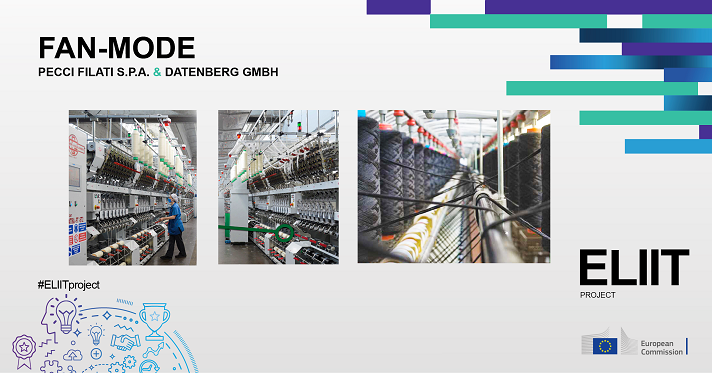Key facts
Sectors covered: Technological innovation in textiles and clothing
Innovation priority: Advanced digitised manufacturing, value chains and business models
Start: 2020
ELIIT funding: €70 000
Pecci produces yarns for the fashion industry. In recent years, the industry has requested more complex yarns, which are difficult to make. The production processes' complexity has raised several quality issues, leading to higher costs for the company.
Currently, Pecci reacts to quality issues after they have arisen, taking action based on the expertise and knowledge of its operators. The company has acquired new machinery with data collection capabilities for the production processes it is now required to follow.
However, it cannot use this data to prevent quality issues from arising, because it does not have the capacity for advanced data analysis.
Under the FAN-MODE project, Pecci and technology provider DatenBerg operate an automated data analysis demonstrator at Pecci’s manufacturing site.
Pecci provides insights into the textile industry's production issues, while DatenBerg supplies data analysis expertise by analysing manufacturing data with dedicated software.
What’s the goal?
Based on data collection and applying prediction models, the demonstrator is designed to help the operators find the causes of quality issues before problems occur. This will save Pecci money, increase efficiency, and improve customer relations in a highly competitive business environment. For DatenBerg, it provides a means to move into the textile industry.
The demonstrator has been developed to be easily transferable to other SMEs in this sector.
Key challenges
Key challenges are to supply real-time data analytics and to develop an automated prediction algorithm for the textile industry. This will provide operators with objective data-based recommendations at a shop-floor level for two scenarios
1) automatically identifying the root causes of quality deviations
2) predicting the product quality in near real-time, based on process parameters.
Implementing the software at Pecci’s manufacturing site will reduce the quantity of non-reworkable material delivered to customers by 30%. This will result in savings of some €250 000 a year.
How has ELIIT helped?
Thanks to ELIIT’s support, as of January 2021, 5 of the 20 machines at Pecci’s manufacturing site have been identified as providing easy access to data. Spinning and winding machines produce a lot of data due to their high number of parallel heads.
Acquisition of smaller quantities of data from devices has been handled jointly, and the whole data collection process has been improved. As a result, initial correlations between machine parameters and the number of failures have been identified, with further steps to follow.
Meet the partners
Established in 2002 and based in Prato, Italy, Pecci Filati makes unique yarns, producing all of them internally at its plant. A wide range of modern technologies allows Pecci to make various types of yarn that are used by several influential clothing brands for knitwear and hand knitting.
Founded in February 2018 and driven by its mission to simplify complex production processes, DatenBerg mainly works in the automotive and rubber compounding sectors.
DatenBerg means “data mountain” in German, which sums up precisely what it does: analysing mountains of data to create valuable analytics for further study. The company started life at the Audi Smart Factory Hackathon, before applying machine learning software to manufacturing.
Its smartPLAZA analysis software helps engineers to understand manufacturing processes better and makes recommendations to operators.
SME: Pecci Filati S.p.A.
Country: Italy
Founded: 2002
Technical provider: DatenBerg GmbH
Country: Germany
Founded: 2018

